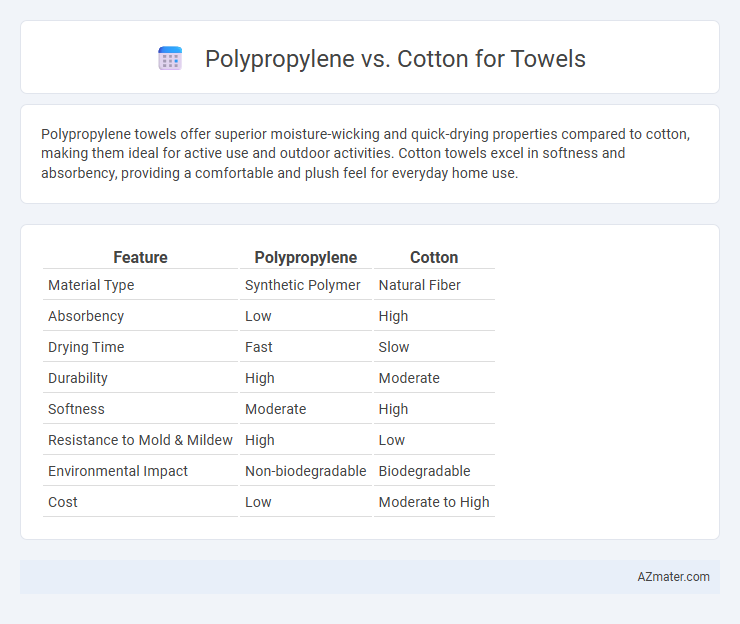Polypropylene towels offer superior moisture-wicking and quick-drying properties compared to cotton, making them ideal for active use and outdoor activities. Cotton towels excel in softness and absorbency, providing a comfortable and plush feel for everyday home use.
Table of Comparison
| Feature | Polypropylene | Cotton |
|---|---|---|
| Material Type | Synthetic Polymer | Natural Fiber |
| Absorbency | Low | High |
| Drying Time | Fast | Slow |
| Durability | High | Moderate |
| Softness | Moderate | High |
| Resistance to Mold & Mildew | High | Low |
| Environmental Impact | Non-biodegradable | Biodegradable |
| Cost | Low | Moderate to High |
Introduction to Polypropylene and Cotton Towels
Polypropylene towels are lightweight, quick-drying, and resistant to moisture, making them ideal for outdoor activities and sports. Cotton towels are highly absorbent, soft, and breathable, providing natural comfort and durability for everyday use. The distinct fiber structures influence their drying times, absorbency rates, and overall user experience.
Material Composition: Polypropylene vs Cotton
Polypropylene towels are made from synthetic polymer fibers that offer quick-drying and moisture-wicking properties, making them lightweight and resistant to mold and mildew. Cotton towels are composed of natural cellulose fibers known for superior softness, high absorbency, and breathability, providing a plush and comfortable feel against the skin. While polypropylene excels in durability and water resistance, cotton remains favored for its natural fiber content and enhanced moisture retention.
Absorbency Comparison
Polypropylene towels offer low absorbency as the material repels water, making them quick-drying but less effective at soaking up moisture compared to cotton. Cotton towels absorb water efficiently due to their natural fibers, providing superior softness and higher water retention capacity. For applications requiring fast drying and moisture wicking, polypropylene is suitable, whereas cotton excels in high absorbency needs like bath towels.
Durability and Longevity
Polypropylene towels exhibit superior durability and longevity compared to cotton due to their synthetic fiber composition, which resists wear, tearing, and moisture absorption. Cotton towels, while soft and breathable, tend to degrade faster with frequent washing and exposure to sunlight, leading to reduced lifespan. The moisture-wicking and quick-drying properties of polypropylene further enhance its resilience, making it ideal for high-use environments or outdoor activities.
Softness and Comfort
Cotton towels are renowned for their supreme softness and natural breathability, providing exceptional comfort against the skin, especially after bathing. Polypropylene towels, while lightweight and quick-drying, often lack the plush softness of cotton, resulting in a less cozy feel. When prioritizing softness and comfort, cotton remains the preferred fabric for towels due to its fiber structure and moisture-absorbing qualities.
Drying Time Differences
Polypropylene towels have significantly faster drying times compared to cotton due to their non-absorbent, hydrophobic fibers that repel water rather than soaking it in. Cotton towels absorb more water, making them feel softer but leading to longer drying periods both after use and laundering. The quick-drying nature of polypropylene reduces the risk of mildew growth and makes it ideal for outdoor or gym towels requiring frequent use.
Maintenance and Care Requirements
Polypropylene towels require minimal maintenance, as they dry quickly and are resistant to mildew and stains, making them ideal for frequent washing without degrading fabric integrity. Cotton towels need more care, including gentle washing and thorough drying to prevent mold and fabric wear, as their natural fibers absorb moisture and hold onto dirt. Proper care for cotton towels involves avoiding bleach and high heat to maintain softness and durability, while polypropylene's synthetic makeup allows for easier upkeep with standard washing routines.
Environmental Impact and Sustainability
Polypropylene towels have a lower water footprint during production compared to cotton towels, as synthetic fibers require less irrigation and land use. However, polypropylene is derived from petroleum, raising concerns about fossil fuel depletion and microplastic pollution from washing. Cotton towels, while biodegradable and renewable, demand significant water, pesticides, and energy, contributing to high environmental impact but offering better end-of-life compostability.
Cost Analysis: Polypropylene vs Cotton Towels
Polypropylene towels are generally more cost-effective than cotton towels due to lower production costs and higher durability, which reduces replacement frequency. Cotton towels, while more expensive initially, offer superior absorbency and comfort, which can justify the higher price in premium applications. Over time, polypropylene towels provide a budget-friendly option with decent performance, whereas cotton towels represent a long-term investment in quality and user experience.
Best Applications for Each Towel Type
Polypropylene towels excel in moisture-wicking and quick-drying properties, making them ideal for gym, pool, and outdoor use where rapid evaporation is essential. Cotton towels provide superior softness and absorbency, best suited for bath and spa applications requiring plush comfort and effective water absorption. Choosing the right towel depends on prioritizing durability and low maintenance with polypropylene or luxurious feel and high absorbency with cotton.

Infographic: Polypropylene vs Cotton for Towel
 azmater.com
azmater.com